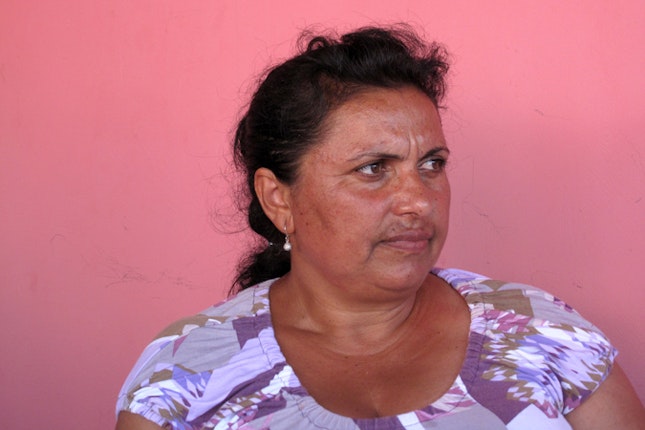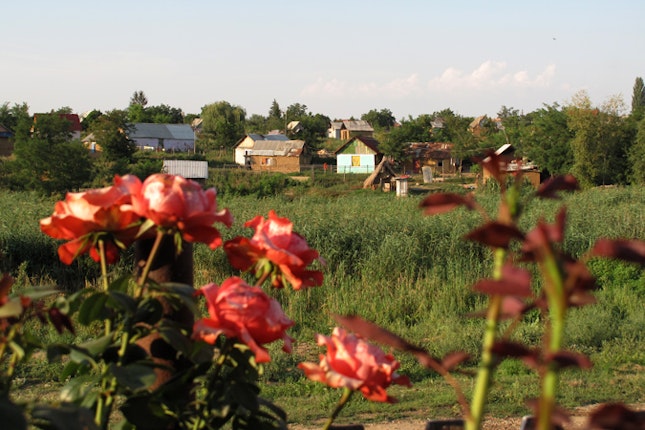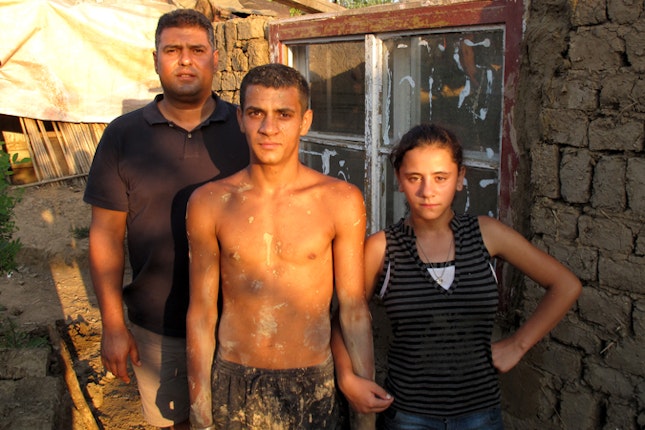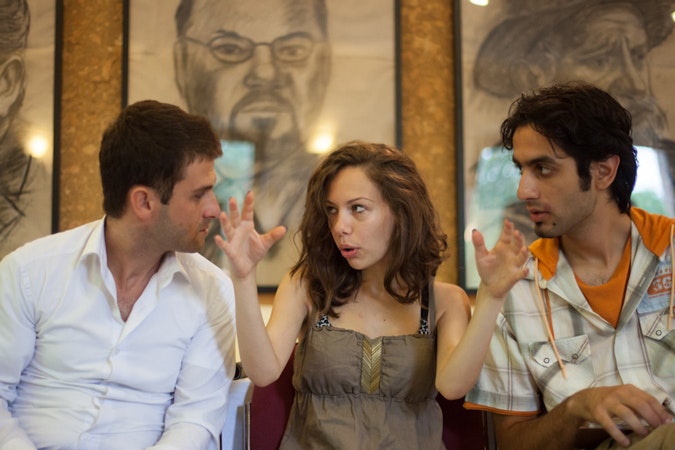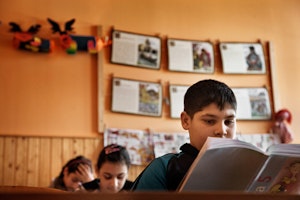Roma in Political Life: Romania—“Household Roma,” Mayors, and .3 Percent
By Chuck Sudetic
How can Roma residing in Romania’s ghettos ever develop a political consciousness sufficiently strong to enable them to claim their rightful place in Romanian and European society? Unemployment and ignorance in these places are endemic. Corruption is rampant. School segregation, wretched housing, and inadequate access to health care are the rule. For many ghetto dwellers, exploitation by ethnic-Romanian and ethnic-Hungarian mayors and local Roma criminals amounts to open-ended indentured servitude.
And how can any Roma community develop a political consciousness when the Romanian government has granted a suffocating monopoly over Roma affairs to one Roma party dominated by a single man?
After 20 years of public, private, and church initiatives that were supposed to have helped them take their rightful place in the mainstream of Romanian and European society, Roma communities remain mired in poverty, bereft of civil society, and excluded from public life in Romania.
“What is freedom of speech when you lack decent housing and food?” asked Nicu Constanza, a Roma lawyer and human rights worker from the port city of Constanța.
A Crisis of Representation
In a 2008 journal article, Aiden McGarry of the School of Economics and Politics at the University of Ulster observed that, unlike the country’s minority ethnic Hungarians, its Roma lacked both a representative class capable of articulating their community’s interests and a middle or intellectual class whose members vote regularly, train other members of their community in how to identify and articulate their common interests, and establish new structures to pursue these interests.
In Romania’s 2002 census, 555,250 Roma accounted for about 3 percent of the country’s population. According to estimates by international and nongovernmental organizations, there are actually two or three times as many Roma in Romania, and they represent 5 to 10 percent of the country’s population.
Of the 314 members of the lower house of Romania’s national parliament, however, just one member—a minuscule 0.3 percent of the body’s membership—represents the Roma, and this person occupies a guaranteed seat. He also happens to lead a party that, in order to maintain near-monopoly control of Roma public affairs, has effectively blocked efforts by Roma activists to bring forth alternative candidates and rally Roma people to vote for them.
The party that controls this near-monopoly on Roma public affairs is actually a nongovernmental organization, the Partida Romilor Pro-Europa, or Pro-Europe Roma Party. As McGarry writes, many officials and political leaders in Romania consider the Partida Romilor to be the only authoritative body representing the country’s factious Roma community. Romania’s government has legitimized its own initiatives, decisions, and strategies on issues affecting the Roma by consulting with the Partida Romilor and has given no other Roma political or civil society organization such influence. The party benefits from an annual stipend and other government support, which guarantee the resources to wage effective political campaigns and enable it to maintain its dominant political position.
“Household Roma”
In towns and villages across the country, ethnic-Romanian and ethnic-Hungarian mayors have hired Roma factotums to dole out rewards and exact punishments to keep local Roma in line. David Mark, a Roma activist, refers to these factotums as “household Roma,” like the household slaves during the Roman Empire.
“The mayors and élite of a village or town have household Roma whom they nurture and use as instruments of oppression over the larger community,” Mark said. “They pay them off with houses. They give them jobs in local institutions. They give them benefits. They allow their small business to exist and thrive, often on the back of the overall Roma community.”
Factotums oversee many critical aspects of Roma life. They regulate the flow of social assistance payments to the poorest Roma. They issue the documents necessary for Roma to obtain state-insured health care. They oversee distribution of benefits provided by foreign charities. They provide cash loans at exorbitant interest rates to Roma who need to buy food for their hungry families, and then, for the same cash, sell the hungry Roma potatoes and other staples at exorbitant prices. They decide which of the destitute Roma will receive opportunities to earn money, and repay their debts, by working locally and by performing seasonal labor on farms across the border in Hungary. And they distribute election-day payoffs that bring voting-age Roma to polling stations to cast their ballots for the same mayors who engage the factotums.
Such systems have for years helped fuel the migration of Roma from Romania to France, Spain, and other prosperous European Union countries.
“Most Roma communities are still controlled by criminals who use whatever influence they have to continue to hold on to their privileges,” said Valeriu Nicolae, a human rights activist and the founder of a Bucharest-based think tank dealing with Roma issues who has worked for years with Roma schoolchildren in a ghetto near Bucharest. “Without a healthy civil society, you can’t have healthy political empowerment. And right now civil society is dysfunctional, and it will take years to correct.”
Nicolae said that in 2011 a group of young, university-educated Roma activists and human rights advocates undertook the first credible attempt to challenge the Partida Romilor’s monopoly by persuading voting-age members of Roma communities to elect representatives to local councils. This group was the Roma Civic Democratic Alliance.
Its collaborators tried to convince the poorest and most indebted Roma to reject ready cash and debt relief and to assume substantial near- and long-term risk by voting for candidates who promised to represent their interests. The Alliance’s campaign angered members of the Roma élite and infuriated many ethnic-Romanian and ethnic-Hungarian mayors as well as Roma factotums and loan sharks.
The effort sputtered after the Alliance was unable to contest seats in the national election. “Instead of working on the grassroots level trying to build credibility, they moved too fast,” Nicolae said. “They were not patient. That was the biggest mistake.”
“But the Alliance was an attempt. It was a good start.”
Disenfranchisement in Sacuene
Sacuene (pronounced SAH-koo-en) is a farm town with a shoe factory and other small enterprises in the rolling plains of western Romania. About 11,000 people were living in Sacuene during the summer of 2012; ethnic Hungarians accounted for 70 percent of the population, Roma 22 percent, and ethnic Romanians 8 percent. The transition from a communist to a free-market economy as well as the economic downturn after the 2008 financial crash left the vast majority of the town’s Roma without jobs.
By 2012, many of them were commuting 50 kilometers to the nearest city, Oradea, to scavenge for food to feed their families. Joblessness and a lack of economic opportunity fueled an outward migration of ethnic Hungarians, many of them educated and enterprising. This increased the relative size of Sacuene’s Roma population and gave the Roma greater potential political power.
“If the outflow of ethnic Hungarians continues at its present rate and if the Roma population continues to grow as it has, the Hungarians and Roma will have nearly equal shares of the population within a few election cycles,” said Sacuene’s ethnic-Hungarian mayor, Csaba Béres. “The Roma already have the potential to exercise a swing vote in the town council, Béres said, and if the demographic trend does not change during the next four years, the Roma will be in a position to run the town government.”
“I don’t fear this,” he added. “It is a natural process. Either way, our town has only one chance to survive, and that is to create jobs.”
Mayor Béres said he was working to convince investors to build and operate greenhouses that would be heated by water from local hot springs. Geothermal heat for greenhouses is a competitive advantage in the production of vegetables, for which world demand and prices are increasing. Low labor costs are another advantage.
“Hungarians and Romanians do not work in the fields, so we will need Gypsy people,” the mayor said, adding that the greenhouses would provide jobs for about 300 laborers who would be chosen from “reliable” members of the Roma population.
“I have my loyal Gypsy workers,” the mayor said. “If I need more, I look for them among those Gypsies who have been working with me for many years.”
For the past eight years, the mayor and his brother have recruited groups of 150 to 200 of Sacuene’s Roma and sent them to Hungary to work as seasonal fruit and vegetable pickers.
“It is legal,” he said. “And a Gypsy from Romania who goes to work in Hungary can earn four times more than the average salary of a Romanian in Romania.”
“The trick for these Gypsies is to spread out their spending and manage their money,” the mayor said. “But the Gypsies are not too smart. After they return home at the beginning of autumn, they spend money with both hands and fail to plan for the future. So they fall into debt.”
In preparing for the local primary election of 2012, Mayor Béres had six factotums from Sacuene’s most powerful Roma families to deal with the town’s other 2,500 or so Roma.
“I don’t talk with all one thousand gypsies who can vote,” he said. “I talk with six Gypsies. These people know what to say and what to do.”
Practically all of the Roma voters cast ballots for Béres in the primary election. After the primary, however, the Roma Civic Democratic Alliance entered the picture. One of the six factotums broke away.
“One of them wanted to be more powerful than the others and became an enemy of the [Hungarian party], and divided the Roma community,” Mayor Béres said.
This “enemy” of the Hungarian party is Erzsébet Hendre. She dared to run for a seat on the local council as a candidate of the Alliance. Hendre was a popular and formidable candidate because, as Sacuene’s health mediator, she spent most of her work day walking from house to house in the Roma community assisting people. She is also a member of one of Sacuene’s largest Roma families as well as a leader in a local Pentecostal church.
The Alliance was also popular among Sacuene’s Roma because it had grown out of a Roma-run nongovernmental organization that had run programs there for three years.
“When the Alliance took shape in 2011, I believed in my heart that it was time to do something more for my people,” Hendre said. “We are no worse than anyone else, and we deserve fair and equal treatment. We decided that it is time to stand up and fight.”
The Alliance’s leader, Marian Daragiu, made repeated visits to organize election campaigns in Sacuene and scores of other towns and villages.
“After so many years running a nongovernmental organization, I got sick of being paid for working on Roma issues and seeing no real changes,” Daragiu said. “I visited the NAACP in Alabama and saw that change can come through political participation.”
By all accounts, the Alliance gained significant traction among the Roma in Sacuene. The organization backed candidates for town council but did not have a candidate for mayor. Instead, it supported an independent ethnic-Hungarian candidate, a rival of Mayor Béres.
“I was expecting this,” Béres said. “I knew that Hendre and the Alliance would win some support from the Gypsy people. But I didn’t know how much. They won more than half of the Gypsy vote. This surprised me.
“But the Gypsies are generally uneducated and illiterate. When they went to the polling stations, people literally had to explain to them that they had to go to a second page on the ballot and check the second square. This was one problem they had. But the Gypsies also vote emotionally. And this time, most voted for two parties, the Hungarian party and the Alliance. They didn’t want our party to be angry at them. So they hit two boxes.”
Voting for two candidates invalidated hundreds of Roma ballots. Erzsébet Hendre failed to win the election. She soon resigned from her job as Sacuene’s Roma health mediator, she said, after the mayor refused to sign her reports and told her she could no longer go out into the community to work.
“Ninety percent of the Gypsies who attacked me during the last election campaign had been taken to Hungary to earn money over the past ten years,” Béres said. “They were not sent this year,” he added, “except for those who happened to be in debt.”
Roma who voted against the mayor complained that, since the election, the town hall has refused to issue them identification cards and papers necessary to obtain health care and welfare payments. One resident said, “The mayor told us that if we voted for the Alliance we should stay three steps away from him for the next four years.”
This article is part of a series examining Roma political participation in France, Hungary, Romania, Macedonia, Bulgaria, and the Czech Republic.
Until November 2013, Chuck Sudetic was a senior writer for the Open Society Foundations.
